
Nicholas Vachel Lindsay was an American poet. He is considered a founder of modern singing poetry, as he referred to it, in which verses are meant to be sung or chanted.
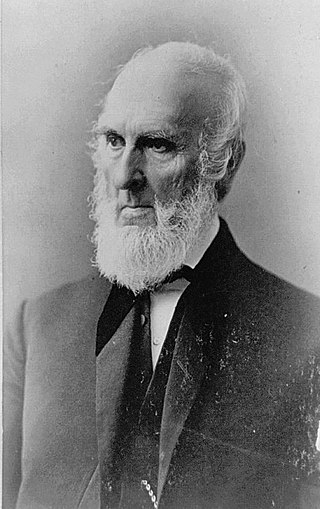
John Greenleaf Whittier was an American Quaker poet and advocate of the abolition of slavery in the United States. Frequently listed as one of the fireside poets, he was influenced by the Scottish poet Robert Burns. Whittier is remembered particularly for his anti-slavery writings, as well as his 1866 book Snow-Bound.

Frances Sargent Osgood was an American poet and one of the most popular women writers during her time. Nicknamed "Fanny", she was also famous for her exchange of romantic poems with Edgar Allan Poe.
William Knox was a Scottish poet. He is known for writing Abraham Lincoln's favourite poem, Mortality, which Lincoln often recited by memory.
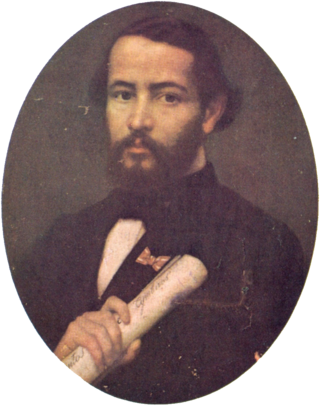
Antônio Gonçalves Dias was a Brazilian Romantic poet, playwright, ethnographer, lawyer and linguist. A major exponent of Brazilian Romanticism and of the literary tradition known as "Indianism", he is famous for writing "Canção do exílio", the short narrative poem I-Juca-Pirama, the unfinished epic Os Timbiras, and many other nationalist and patriotic poems that would award him posthumously with the title of national poet of Brazil. He was also an avid researcher of Native Brazilian languages and folklore.
The sexuality of Abraham Lincoln, and the possibility of his homosexuality, has been the topic of historical speculation and research. No such discussions have been documented during Lincoln's lifetime; however, some historians and authors have recently discussed what they say is evidence that he may not have been heterosexual. Proponents of this claim have cited the fact that he shared a bed with Joshua Fry Speed for four years, when both were bachelors, and a poem he wrote that referred to a marriage between two men as evidence.
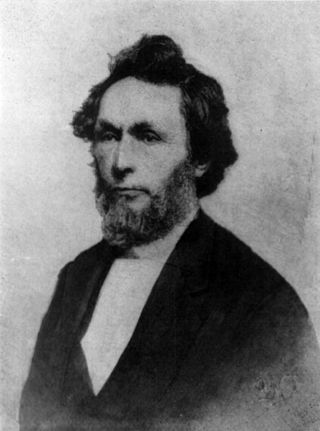
William Henry Herndon was a law partner and biographer of President Abraham Lincoln. He was an early member of the new Republican Party and was elected mayor of Springfield, Illinois.

Ann Mayes Rutledge was allegedly Abraham Lincoln's first love.

Joshua Fry Speed was an American politician who was a close friend of future President Abraham Lincoln from his days in Springfield, Illinois, where Speed was a partner in a general store. Later, Speed was a farmer and a real estate investor in Kentucky, and also served one term in the Kentucky House of Representatives in 1848.

János Garay was a Hungarian poet and author, born in Szekszárd, Tolna County. From 1823 to 1828 he studied at Pécs, and subsequently, in 1829, at the University of Pest. In 1834 he brought out an heroic poem, in hexameters, under the title Csatár. Garay was an energetic journalist, and in 1838 he moved to Pozsony, where he edited the political journal Hírnök (Herald). He returned to Pest in 1839, when he was elected a corresponding member of the Hungarian Academy of Sciences. In 1842 he was admitted into the Kisfaludy Society, of which he became second secretary.
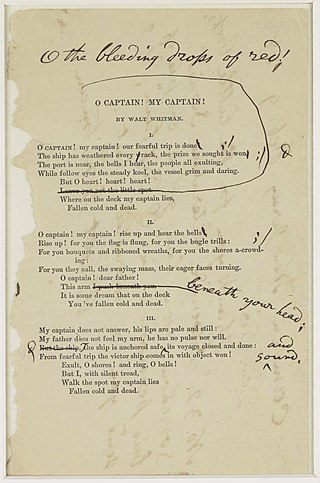
"O Captain! My Captain!" is an extended metaphor poem written by Walt Whitman in 1865 about the death of U.S. president Abraham Lincoln. Well received upon publication, the poem was Whitman's first to be anthologized and the most popular during his lifetime. Together with "When Lilacs Last in the Dooryard Bloom'd", "Hush'd Be the Camps To-day", and "This Dust was Once the Man", it is one of four poems written by Whitman about the death of Lincoln.

Abraham Lincoln was born on February 12, 1809, in a one-room log cabin on the Sinking Spring farm, south of Hodgenville in Hardin County, Kentucky. His siblings were Sarah Lincoln Grigsby and Thomas Lincoln, Jr. After a land title dispute forced the family to leave in 1811, they relocated to Knob Creek farm, eight miles to the north. By 1814, Thomas Lincoln, Abraham's father, had lost most of his land in Kentucky in legal disputes over land titles. In 1816, Thomas and Nancy Lincoln, their nine-year-old daughter Sarah, and seven-year-old Abraham moved to what became Indiana, where they settled in Hurricane Township, Perry County, Indiana.
"The Suicide's Soliloquy" is an unsigned poem, possibly written by Abraham Lincoln, first published on August 25, 1838, in The Sangamo Journal, a four-page Whig newspaper in Springfield, Illinois.

William Wallace "Willie" Lincoln was the third son of President Abraham and Mary Todd Lincoln. He was named after Mary's brother-in-law, Dr. William Smith Wallace. He died of typhoid fever at the White House, during Abraham's presidency.
The Hon. William Herbert was a British botanist, botanical illustrator, poet, and clergyman. He served as a member of parliament for Hampshire from 1806 to 1807, and for Cricklade from 1811 to 1812. His botanical writings are noted for his treatment of Amaryllidaceae.
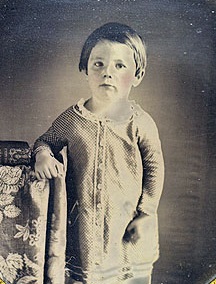
Edward Baker Lincoln was the second son of Abraham Lincoln and Mary Todd Lincoln. He was named after Lincoln's close friend, Edward Dickinson Baker. Both Abraham and Mary spelled his name "Eddy"; however, the National Park Service uses "Eddie" as a nickname and the nickname also appears spelled this way on his crypt at the Lincoln tomb.

Abraham Lincoln grew up in a highly religious Baptist family. He never joined any Church, and was a skeptic as a young man and sometimes ridiculed revivalists. He frequently referred to God and had a deep knowledge of the Bible, often quoting it. Lincoln attended Protestant church services with his wife and children. "Especially after the death of his young son Willie in 1862, Lincoln moved away from his earlier religious skepticism." Some argue that Lincoln was neither a Christian believer nor a secular freethinker.

Nathan Covington Brooks was an American educator, historian, and poet. Born in West Nottingham, Cecil County, Maryland, Brooks grew up to become the first principal of Baltimore City College, the third oldest public high school in the United States, and the only president of the Baltimore Female College, the first institution of higher education for women in Maryland. He also was the owner of The American Museum, a literary magazine, in which he published several works of the famed poet Edgar Allan Poe, and the author of several textbooks on classical literature. Brooks died in Philadelphia, Pennsylvania.
Abraham Lincoln's health has been the subject of both contemporaneous commentary and subsequent hypotheses by historians and scholars. Until middle age, his health was fairly good for the time. He contracted malaria in 1830 and 1835; the latter was the worse of the two cases. He contracted smallpox in 1863 during an 1863 to 1864 epidemic in Washington, D.C.

Abraham Lincoln: A History is an 1890 ten-volume account of the life and times of Abraham Lincoln, written by John Nicolay and John Hay, who were his personal secretaries during the American Civil War.














